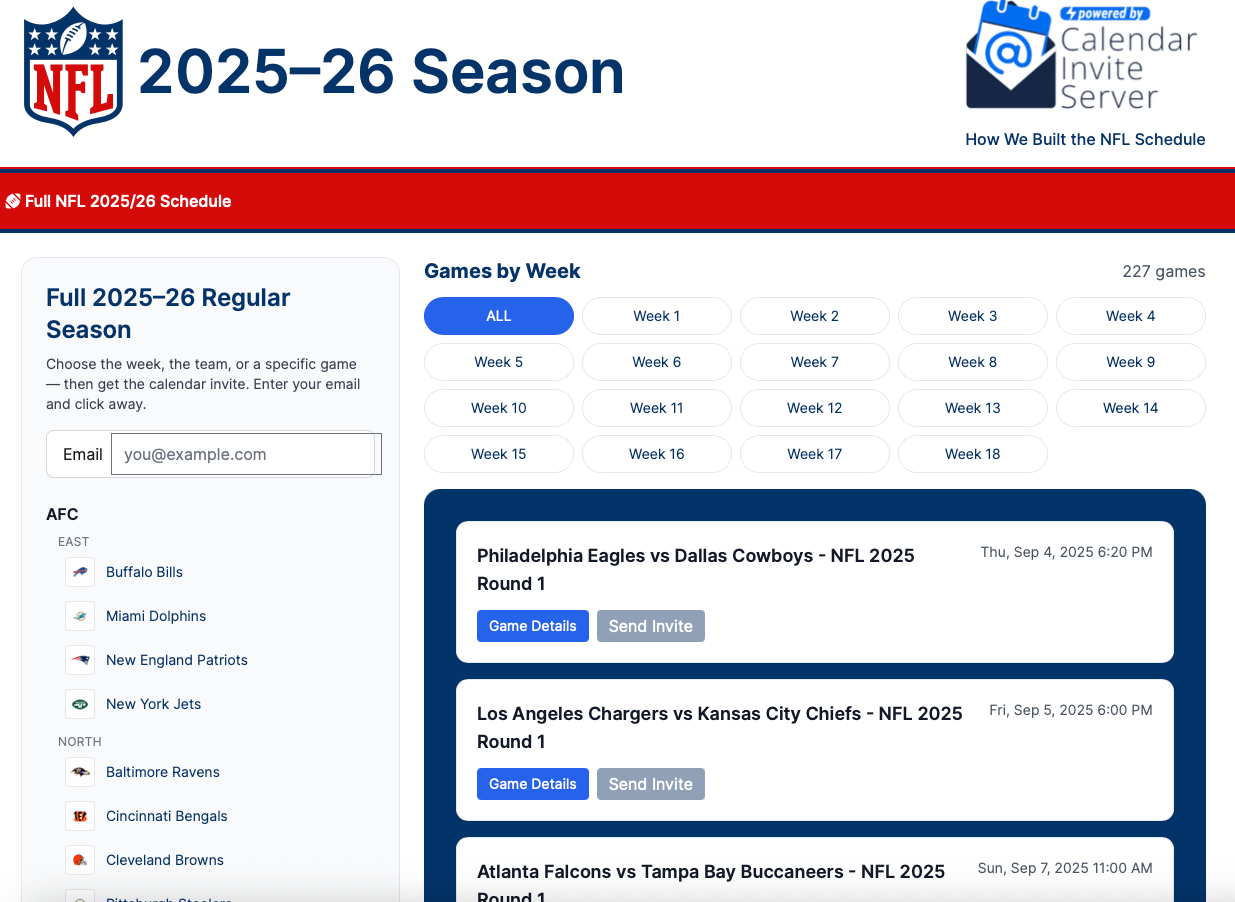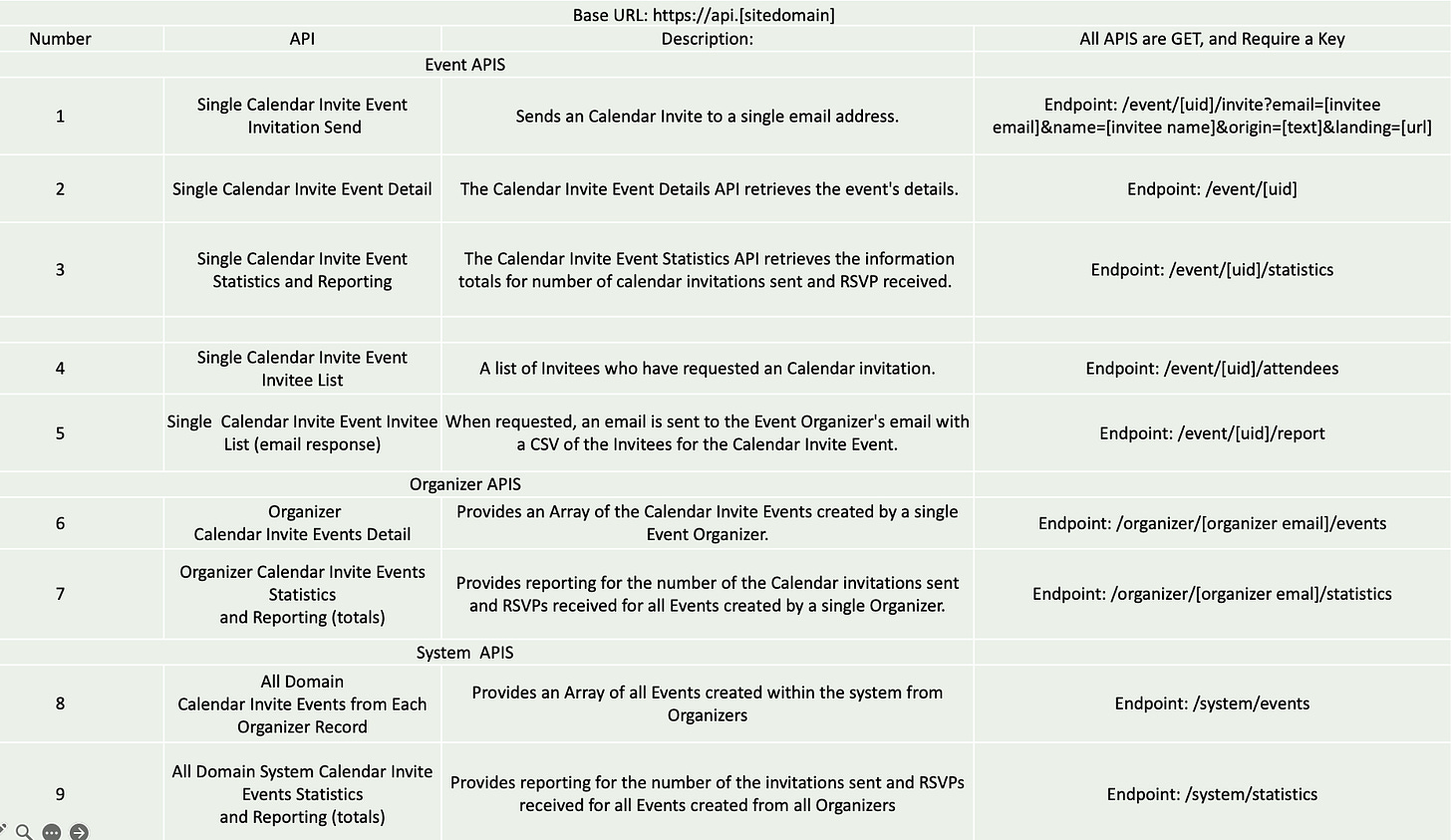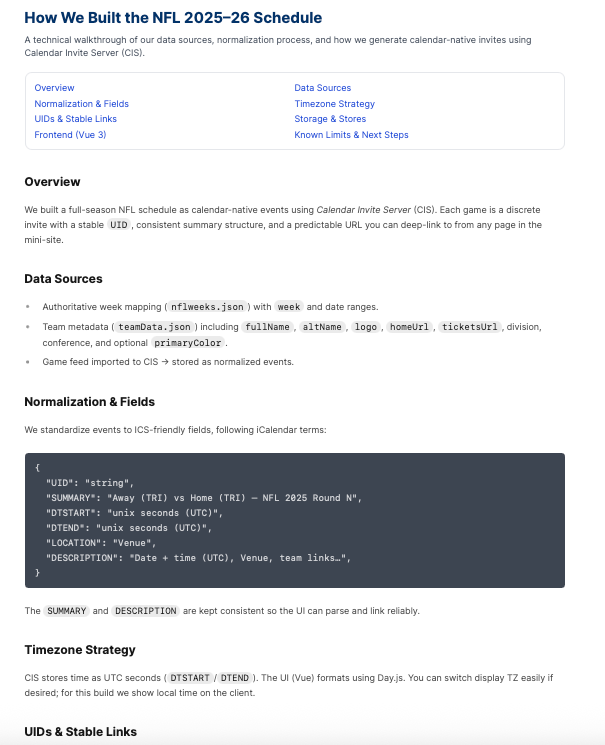Deep Dive on AWS Calendar Invite Server for NFL Calendar Invite Sending of promotions, merch and tickets
This is a setup for Arnie's work on building out the NFL Custom Game Calendar
Briefing Document: NFL 2025 AWS Calendar Invite Server Deep Dive
Date: October 26, 2023
Summary
This presentation outlines a comprehensive system for managing and distributing calendar invitations, with a specific focus on the NFL 2025 schedule.
The process begins with ingesting pre-baked calendar data (like an iCal file for a particular team) into a Google or Outlook calendar, where it can be organized into filtered, team-specific sub-calendars. This data is then uploaded to an AWS calendar invite server via a specialized "create" command, which also facilitates the creation of a public landing page for users to select and receive invites. A key feature is the system's ability to automatically update or cancel sent invites when changes are made by the organizer, ensuring recipients always have the latest information. Finally, the platform offers powerful tracking and analytics for all distributed calendar invitations, providing detailed insights into user engagement.
Purpose: This document provides a detailed review of the "NFL 2025 AWS Calendar Invite Server Deep Dive" source, outlining its central themes, key ideas, and essential facts regarding the system designed to manage and send NFL 2025 schedule calendar invites.
The AWS Calendar Invite Server creates, sends, updates, and cancels calendar invites using an automated pipeline that utilizes the AWS stack with the Organizer Calendar Client as a CRUD interface.
The invention comprises 30 functions and nine core APIs for moving and shuffling calendar invite data in the pipeline, facilitating calendar invite sending from the REST API we have developed.
When called, the Embedded Calendar Invite API sends a calendar invite by reconstructing the data and sending it using the Event UID and email address with AWS SES RAW API.
The two use cases are for Bulk Calendar Invite Sending and embedded calendar invite sending of event pages using this API in this demo.
This API also requests calendar receipts for tracking Y, N, and M events, facilitating data analytics, and supporting a decision-making process for sending calendar invite updates based on customer engagement with the calendar invite.
The ingest process deconstructs the calendar invite data using the organizer’s calendar client and stores it for later recall with the embedded calendar invite sending API.
For the organizer, all they do is add us to the calendar invite by using create@calendarsnack.com.
At any time, the Organizer can execute a Calendar Invite Command in the Calendar Client to update or cancel the data in the Calendar Invite server.
The AWS Calendar Invite Server then executes the data pipeline update using SNS and SQS to initiate the Lambda functions, completing the storage and database inserts.
It does so by using the already created event in the Database to track, matching the UID, and then executing the workflow based on the Calendar Client's request.
That new data is now ready to be pulled from the API’s as needed to display analytics or decide if the calendar invite needs to be updated or canceled as part of a promotion, change of venue, or update for time slot changes.
The AWS tech stack can be installed and up and running for any-sized AWS account in one hour and is well-documented in 150 blog posts, over 700 videos, and a detailed build history of the server, as well as the front-end application called Calendarsnack.
The GitHub Wiki can be found here, featuring 30 chapters that include API details.
https://github.com/calendarinvite/calendarinviteserver/wi
Arnies take on Big Game Data, Displaying Calendars with the Embedded Calendar Invite API.
How to design and develop a new way to get a calendar invite into a web page or touch screen for one-click sending.
How Arnie built the Front End using Vue.js and the AWS Calendar Invite Server APIs.
https://nfl2025.31events.com/docs
Executive Summary
The briefing outlines a system for importing the NFL 2025 schedule data into a Google or Outlook calendar and then utilizing the AWS calendar invite server to display this data and send trackable calendar invitations to customers. The solution emphasizes ease of data import, advanced filtering capabilities, and robust functionality for creating, updating, and canceling calendar invites, with a focus on tracking user responses and providing granular data for organizers. Key components include a method for acquiring pre-baked iCal files, integration with personal calendars for filtering, and a powerful AWS-backed system for sending and managing invites at scale.
Main Themes & Key Concepts
Efficient Data Ingestion & Management with use of the Calendar Client:
Acquiring Game Data: The system begins by acquiring "pre-baked calendar data from fixture download.com," which provides iCal files for global teams. The specific example focuses on the Arizona Cardinals, noting "17 games to go get per team times 32 teams."
Personal Calendar Integration: Users download the iCal file and "upload that into your Google calendar. It's that simple.”
Advanced Filtering (Hack): A crucial "trick or hack" involves creating new, team-specific calendars (e.g., "Arizona Cardinals") within a personal Google or Outlook account. This allows for easy toggling and management of "thousands of events of data off of one Gmail calendar." This method can be applied across different sports (NBA, NFL, MLB).
Ease of Import: The process of importing the ICS file into a filtered calendar is described as "very simple."
AWS Calendar Invite Server Functionality:
Ingestion into AWS: Once game data is loaded into a filtered personal calendar, users send these events to the "AWS calendar invite server" using the "create@countersnack.com" command. This command "ingests the data" and triggers an "auto bot email saying the calendar information's been ingested into the AWS calendar invite server."
Data Processing: The AWS server "disassemble[s] the calendar invite when it's new" and reassembles it for sending. It supports updates and cancellations.
APIs for Developers: The system offers "nine APIs for developers to work with," though the demonstration focuses on the "calendar snack application," a free tool bundled with the AWS calendar invite server.
Display on Landing Page: The ingested data is displayed on an "upcoming landing page" via the "calendar snack app talking to the AWS countervite server." This page allows customers to "select a calendar invite and click one button and get the calendar invite."
Single Calendar Invite Send: A "single calendar invite send API" is used when a customer clicks a button, enters their email, and receives an invitation.
Update and Cancellation Mechanism:
Iterative Updates: The system supports "unlimited" changes by the organizer in their Google or Outlook calendar. When an organizer updates an event (e.g., changing start time, adding a promotion), the system "reprocess[es] that data" and it automatically "show[s] back up on the display APIs" and "push[es] the data downstream," resulting in an "automatic update to the calendar invite that was sent off the upcoming landing page."
Lambda Listener: A "lambda listener" picks up calendar receipt data for updated events and stores it in S3.
Automatic Cancellation: If an organizer deletes an event from their calendar, a "cancel command" is triggered, and the system "automatically determines [s] if it's already been sent" and sends the cancel calendar invite match to the UID to the customers who have said yes or maybe”
Tracking & Analytics:
Event Organizer Dashboard: Data from sent calendar invites is tracked in the "event organizer dashboard," providing "nice rich granulated detail of what's going on with these particular calendar events."
Calendar Receipt Data: The system "collects all the calendar receipt data" from various channels (bulk, landing page, embedded). This data is "granulated here in these really detailed deep dives on the data itself."
UID-based Tracking: Each new calendar invite is assigned a "UID" (Unique Identifier), enabling tracking of individual events and recipient responses (yes, no, maybe). This produces "high definition data for the dashboards on a per UID event."
Use Cases & Scalability:
Two Primary Use Cases: Embedded Calendars for One-Click Sending - Displaying all upcoming events on a page where customers can click to receive an invitation.
Bulk Sending to Email Lists: Uploading a list of emails to send "big batch runs" of calendar invites.
Transactional & Embedded Marketing: The system primarily serves "transactional marketing calendar invites or embedded web calendar invites for sporting or ticketing events."
Scalability: The system is designed to "send calendar at scale" and can handle "tens of thousands of sends per about every 5 minutes or so when you start queuing the big batches." It also supports the goal of sending "52 million calendar invites a year" at a low cost.
AWS Tech Stack: The backend leverages various AWS services including "Lambda's SCES SNS SQS Dynamo S3 and the API gateway."
Most Important Ideas & Facts
Source of Game Data: fixturedownload.com is the recommended site for pre-baked iCal files for global teams, explicitly mentioning the NFL 2025 schedule data for 32 teams (17 games per team).
Google/Outlook Integration Hack: Creating dedicated game calendars (e.g., "Arizona Cardinals") within a personal calendar account is a simple yet powerful method for organizing and filtering thousands of events.
create@calendarsnack.com Command: This is the critical email address used to ingest calendar event data from a personal calendar into the AWS calendar invite server.
AWS Calendar Invite Server: This is the core platform that processes, stores, and sends calendar invites. It offers a set of 9 APIs for developers.
Calendar Snack Application: A front-end application provided free with the AWS server, demonstrated for managing and displaying events.
Automatic Updates & Cancellations: Changes made by the organizer in their personal calendar automatically trigger updates or cancellations to already-sent invitations, ensuring recipients always have the latest information.
UID (Unique Identifier): Each new calendar invite is assigned a UID, which is fundamental for tracking individual events and recipient responses.
Data Tracking & Granularity: The system collects comprehensive "calendar receipt data" for "yes, no, or maybe" responses, stored in S3, providing "high definition data for the dashboards."
Scalability & Cost-Effectiveness: The solution is built on AWS to support sending "calendar at scale," capable of handling massive volumes of invites at a low estimated cost (e.g., "52 million calendar invites a year").
Two Main Use Cases: Embedded web calendars for one-click invites and bulk sending to email lists.
Deployment: The "AWS calendar server" can be "downloaded configured in your AWS account under one hour." D” D” Documentation is available via a GitHub wiki.
Source guide - Note: AI got it wrong; there are not 17 games, but 18 weeks or 18 games. LOL.




